高级英语第二课
高级英语第二课

More About Japan
• ●Government: Diet (parliament) consists of a house of Representatives of 511 members elected for four years, • and a house of Councillors of 252 members, • half of whom elected every three years for sixyear terms. • Executive power is vested in the Cabinet, • which is headed by a Prime Minister, nominated by the Diet from its members.
II. Background information
• 1 Japan
II. Background information
• ●National Name: Nippon • ●Geography: Four main islands: Honshu (本 州), Hokkaido (北海道), Kyushu (九州), and Shikoku (四国) • ●Area: 371,857 square km. • ●Population: 127,760,000 (2008). • ●Capital: Tokyo • ●Monetary unit: Yen
• • • • •
History about WWII
• • • •
• • • •
Aug. 6, 1945: The first A-bomb exploded on Hiroshima. Aug. 8, 1945: The USSR declared war on Japan and occupied Manchuria. Aug. 9, 1945: The second A-bomb was dropped on Nagasaki. Aug. 14, 1945: Japan announced its surrender
高级英语第二课doc
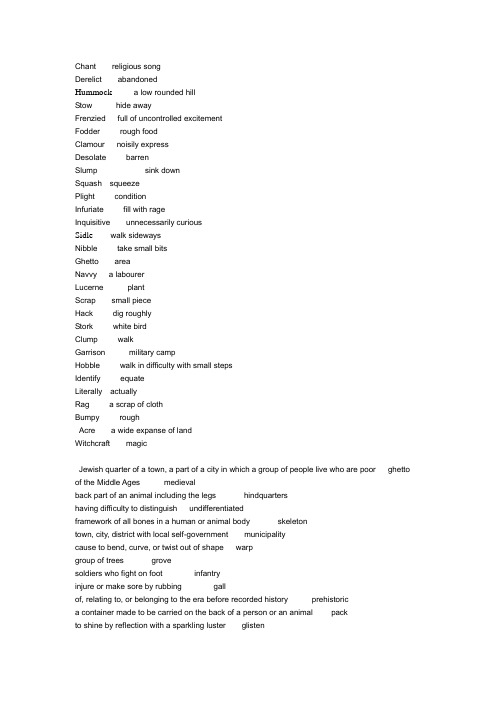
Chant religious songDerelict abandonedHummock a low rounded hillStow hide awayFrenzied full of uncontrolled excitementFodder rough foodClamour noisily expressDesolate barrenSlump sink downSquash squeezePlight conditionInfuriate fill with rageInquisitive unnecessarily curiousSidle walk sidewaysNibble take small bitsGhetto areaNavvy a labourerLucerne plantScrap small pieceHack dig roughlyStork white birdClump walkGarrison military campHobble walk in difficulty with small stepsIdentify equateLiterally actuallyRag a scrap of clothBumpy roughAcre a wide expanse of landWitchcraft magicJewish quarter of a town, a part of a city in which a group of people live who are poor ghetto of the Middle Ages medievalback part of an animal including the legs hindquartershaving difficulty to distinguish undifferentiatedframework of all bones in a human or animal body skeletontown, city, district with local self-government municipalitycause to bend, curve, or twist out of shape warpgroup of trees grovesoldiers who fight on foot infantryinjure or make sore by rubbing gallof, relating to, or belonging to the era before recorded history prehistorica container made to be carried on the back of a person or an animal packto shine by reflection with a sparkling luster glistena feeling of profound awe and respect and often love reverenceto deceive in fun; fool kida formation, as of troops or vehicles, in which all elements follow one behind the other column one that inhabits a place, especially as a permanent resident inhabitanteasily broken or destroyed fraila crossbar with two U-shaped pieces that encircle the necks of a pair of oxen or other draft animals working together yokea trench, furrow, or groove channelto cause to shrivel and dry up mummifyof or relating to an earliest or original stage or state primitiveto become reduced in amount or value; dwindle shrinkvery good or satisfying; praiseworthy splendidto inhabit or overrun in numbers large enough to be harmful infest1. The child[01]for the toy.2. We took a long walk and[02] wound up at the edge of town.3. I think what[03appeals to]me about his painting is the colours he uses.4. Nowadays, the streets in some places of the city[04] were infested with drugs.5. The policemen were trying [05] to wring the truth out of the recalcitrant witness.6. The temperature[06] has lowered gradually this month.7. He has made a[07] splendid performance in the examinations.8. The wooden frame[08] warped in the humidity.9. The office was a scene of[09] frenzied activity this morning.10. Air is[10] invisible but we can feel its motion when there is a wind。
高英第2课PPT课件
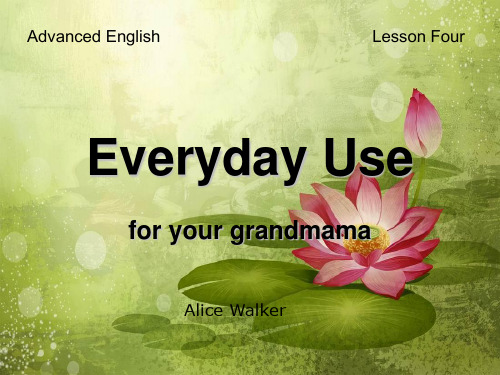
*
11
Theme
• The story praises the simplicity of Maggie and her mother, along with their allegiance (忠诚) to their specific family identity (身份) and folk heritage (民族传统) as well as their refusal to change at the whim (一时的 兴致) of an outside world that doesn’t really have much to do with them.
*
5
Homework
• (2-2) Words and Expressions: • Ex IV (Word replacement) • Ex IX (crop, put, keep, bring, hang, hand,
style, stick, carry) • Ex XII (C-E translation)
*
3
Homework
• (1) Reading Comprehension: • Ex I (Questions) • Ex II (Paraphrase) • Ex III (E-C translation)
*
4
Homework
• (2-1) Words and Expressions: • Refer to “word list.doc”
*
12
Theme
• “Everyday Use”, a story addresses itself to (针对…而写) the dilemma of African Americans who,
高级英语第二课笔记
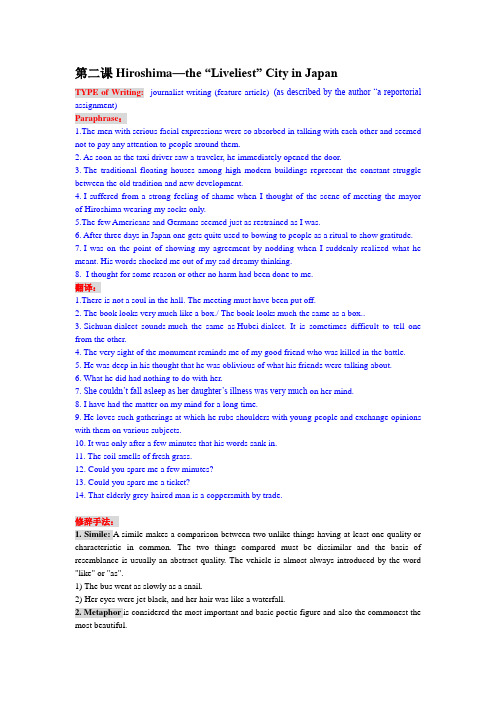
第二课Hiroshima—the “Liveliest” City in JapanTYPE of Writing: journalist writing (feature article) (as described by the author “a reportorial assignment)Paraphrase:1.The men with serious facial expressions were so absorbed in talking with each other and seemed not to pay any attention to people around them.2. As soon as the taxi driver saw a traveler, he immediately opened the door.3. The traditional floating houses among high modern buildings represent the constant struggle between the old tradition and new development.4. I suffered from a strong feeling of shame when I thought of the scene of meeting the mayor of Hiroshima wearing my socks only.5.The few Americans and Germans seemed just as restrained as I was.6. After three days in Japan one gets quite used to bowing to people as a ritual to show gratitude.7. I was on the point of showing my agreement by nodding when I suddenly realized what he meant. His words shocked me out of my sad dreamy thinking.8. I thought for some reason or other no harm had been done to me.翻译:1.There is not a soul in the hall. The meeting must have been put off.2. The book looks very much like a box./ The book looks much the same as a box..3. Sichuan dialect sounds much the same as Hubei dialect. It is sometimes difficult to tell one from the other.4. The very sight of the monument reminds me of my good friend who was killed in the battle.5. He was deep in his thought that he was oblivious of what his friends were talking about.6. What he did had nothing to do with her.7. She couldn’t fall asleep as her daughter’s illness was very much on her mind.8. I have had the matter on my mind for a long time.9. He loves such gatherings at which he rubs shoulders with young people and exchange opinions with them on various subjects.10. It was only after a few minutes that his words sank in.11. The soil smells of fresh grass.12. Could you spare me a few minutes?13. Could you spare me a ticket?14. That elderly grey-haired man is a coppersmith by trade.修辞手法:1. Simile: A simile makes a comparison between two unlike things having at least one quality or characteristic in common. The two things compared must be dissimilar and the basis of resemblance is usually an abstract quality. The vehicle is almost always introduced by the word "like" or "as".1) The bus went as slowly as a snail.2) Her eyes were jet black, and her hair was like a waterfall.2. Metaphor is considered the most important and basic poetic figure and also the commonest the most beautiful.1) Snow clothes the ground.2) The town was stormed after a long siege.3) Boys and girls, tumbling in the streets and playing, were moving jewels.Examples in the text:1) I had a lump in my throat2) At last this intermezzo came to an end...3) I was again crushed by the thought...4) ...when the meaning ... sank in, jolting me...3. Metonymy(借代、换喻)Uses sth generally or loosely associated with a concept to stand in for it.1) ...little old Japan adrift amid beige concrete skyscrapers ...struggle between kimono and the miniskirt2) I thought that Hiroshima still felt the impact4. Euphemism: the substitution of an agreeable or inoffensive expression for one that may offend or suggest sth unpleasant. e.g:1) He was sentenced to prison---He is now living at the government's expenses.2) The boy is a bit slow for his age.3) to go to heaven---dead4) to go to the bathroom, do one's business, answer the nature's call, put an end to my life.5) Each day of suffering that helps to free me from earthly cares.5. Irony: People say the opposite of what they mean. For example, if the day has been terrible, you say, “Boy, this has been a great day!”Irony is more emphatic than a point-blank statement of the truth. It achieves its effect by reminding you of the opposite reality and this providing a scale by which to judge the resent reality.1) Hiroshima---the Liveliest City in Japan2) the good fortune that my illness has brought me6. Anti-Climax: A Humorous Figure of Speech, which refers to any of the following:a. A decline viewed in disappointing contrast with a previous rise: the anticlimax of a brilliant career.b. something trivial or commonplace that concludes a series of significant events: After a week of dramatic negotiations, all that followed was anticlimax.c. A sudden descent in speaking or writing from the impressive or significant to the ludicrous or inconsequential, or an instance of it;1) Alas!Alas!What shall I do? I've lost my wife and best hat, too!哎呀哎呀!我怎么办呢?我失去了妻子,又丢了最好的帽子!2) The duties of a soldier are to protect his country and peel potatoes.士兵的职责是保卫祖国和剥土豆皮。
高级英语 Lesson2 Marrakech 课件
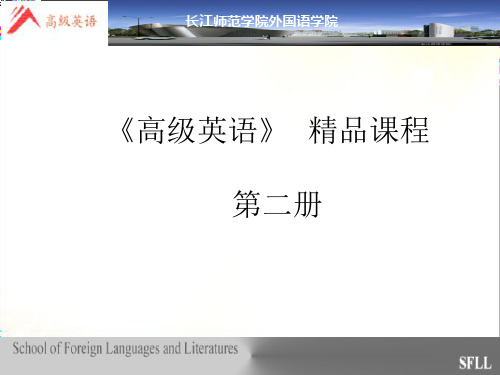
Six Scenes to expose the evils of colonialism
Why did the writer choose these scenes? What do you think they represent? Do you think these scenes are effective to achieve the writer’s purpose? What else would you add? What is the tone of the writer throughout the text?
The list of action verbs are all single-syllabic, showing the quick speed and simple burying procedure
Are they really…? Do they …? Or are they … individual as bees or coral insects?
A list of rhetorical questions added force to author‘s denunciation
They rise out of the earth, they sweat and starve for a few years, and then they sink back into the nameless mounds of the graveyard and nobody notices that they are gone.
1955wroteprofilesincouragewhichwonthepulitzerprizeinhistorypresidentoftheunitedstates196163???????????????????johnfitzgeraldkennedy19171963born
高级英语第四版第二课修辞

高级英语第四版第二课修辞摘要:一、引言二、高级英语第四版第二课修辞概述三、课程内容提要1.比喻2.明喻和暗喻3.提喻4.拟人5.反讽6.排比四、修辞手法在英语写作中的应用五、总结与反思正文:【引言】高级英语课程旨在帮助学生提高英语水平,使他们能够熟练地运用英语进行沟通和表达。
在第四版第二课中,我们学习了修辞这一重要主题。
修辞是一种通过语言手段,使表达更加生动、形象和具有感染力的方法。
本篇文章将概括介绍课程中的修辞内容。
【高级英语第四版第二课修辞概述】修辞是一种艺术,通过运用特定的语言技巧,使文本更加吸引人、有趣和易于理解。
在高级英语第四版第二课中,我们学习了多种修辞手法,包括比喻、明喻和暗喻、提喻、拟人、反讽和排比等。
这些修辞手法可以帮助我们更有效地传达思想和感情。
【课程内容提要】1.比喻:比喻是通过将一个事物与另一个事物相比较,从而形象地表达出某种特性的修辞手法。
例如:“时间是金钱。
”2.明喻和暗喻:明喻是直接比较两个事物,而暗喻则是通过暗示进行比较。
例如:“她的眼睛是星星。
”(明喻)和“她是个睡美人。
”(暗喻)3.提喻:提喻是通过部分代表整体或通过整体代表部分的修辞手法。
例如:“杯水车薪。
”4.拟人:拟人是一种赋予非人类事物人类特征的修辞手法。
例如:“月亮害羞地躲在云朵后面。
”5.反讽:反讽是通过表达与字面意义相反的意义,从而产生幽默或讽刺效果的修辞手法。
例如:“祝你度过一个美好的时光。
”(用于分手场景)6.排比:排比是通过重复相同或类似的结构,以强调某个观点或情感的修辞手法。
例如:“生命在于运动,健康在于运动,美丽在于运动。
”【修辞手法在英语写作中的应用】在英语写作中,运用修辞手法可以使文章更具表现力和吸引力。
例如,使用比喻可以使抽象概念更具体化,使用拟人可以让描述更生动有趣。
恰当运用修辞手法有助于作者更好地传达思想和情感,同时也能让读者在阅读过程中获得愉悦。
【总结与反思】通过学习高级英语第四版第二课中的修辞内容,我们了解了多种修辞手法及其在英语写作中的应用。
【ppt课件】高级英语课本第2课课件.ppt
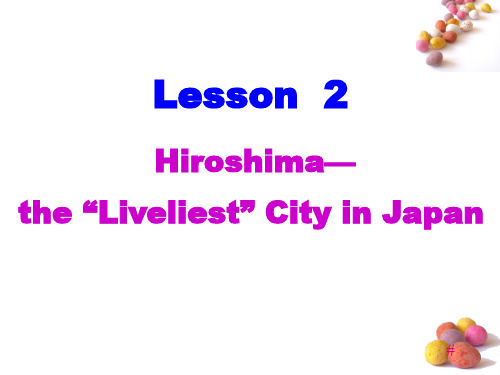
Atomic Bombing over Hiroshima
On August 6, 1945, during World War II (1939-1945), the first atomic bomb was dropped on the city of Hiroshima, a military center, by the United States Army Air Forces. According to U.S. estimates, 60,000 to 70,000 people were killed or missing as a result of the bomb and many more were made homeless. (In 1940, the population of Hiroshima was 343,698.)
#
The Bomb Called “Little Boy” (H1.47m)
Though the bomb was long and thin in shape, it grew shorter over the course of the project. Hence, the final bomb was called “Little Boy ”.
Many more later died of injuries and the effects of radiation. Casualties ered nearly 130,000. Survivors are still dying of leukemia, pernicious anemia and other diseases induced by radiation.
1. About Hiroshima 2. Atomic Bomb
高级英语第二册第二课Marrakech

• Sometimes, out for a walk as you break your way through the prickly pear, you notice that it is rather bumpy underfoot, and only a certain regularity in the bumps tells you that you are walking over skeletons.”
•
They rise out of the earth, they sweat and starve for a few years, and then they sink back into the nameless mounds of the graveyard and nobody notices that they are gone.
他似没有牢记这些事实?他似乎没有牢记这些事实
Paragraph 3
• Could you find the thesis of this essay?
detail study
• “own literally nothing except the rags they stand up in” • the rags they stand up in:the rags which they were wearing as they there The shabby, much worn rags they are wearing at the moment are the only clothes they own.
Could you find the thesis of this essay?
• All colonial empires are in reality founded upon this fact. • And in this paragraph the writer exposes the evils of colonialism
高级英语 第二课_Marrakech_完备课件
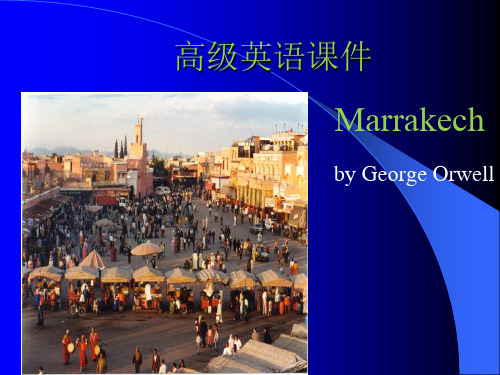
His Life
– He is mush praised in the west partly because of his anti-communist point of view.
– He was born in India, father, a so called empirebuilder --serving the British government abroad.
e. People: most Muslims; Most (70%) Moroccans are farmers, using camels, donkeys and mules to pull plows, trying to try to grow their own food. In the South a few tribesmen still wander from place to place in the desert.
---Renowned for leather goods --- the old city is like a labyrinth (迷宫 ) full of
crooked, deadened streets.
Marrakech
Marrakech is not only a fantastic city, it is also a symbol of the Morocco that once was, and which still survives here. The streets of the old and pink city have been too narrow to allow the introduction of cars, and tourists searching for the "real" Morocco have turned the medieval structures of Marrakech into good business.
高级英语第二课Lesson Two Four Choices for Young People
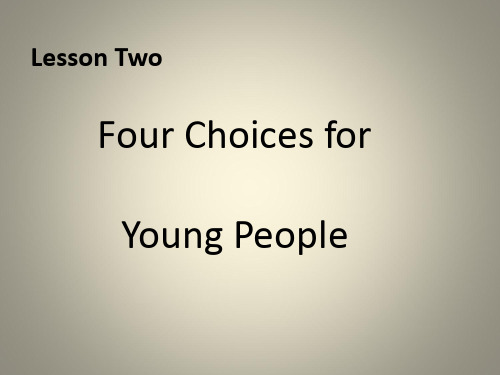
Noble savage 高贵的野蛮人
• First appeared: John Dryden The Conquest of Granada
• First used by: Jean-Jacques Rousseau (1754-1762) Naturalright
Hallucinogens(Para.4) 幻觉剂
• the Allies and the Axis
Backgrounds
War in unfamiliar guise(Para.13)
Non-military war, unfamiliar forms. Such as the War on Poverty launched by President Lyndon Johnson in 1964.
Backgrounds
“The economic machinery had broken down almost everywhere...” (Para. 12) • The economic crisis in western countries in the 1930s
• The Great Depression in U.S.
Brief of the Article
• Youth disillusioned with “the adult world”
• Rebellion • Workable way to deal with problems • 3+1 good way of persuasion
Backgrounds
Backgrounds
Our discovery of the population explosion (Para.13)
最新高级英语lesson2原文及翻译
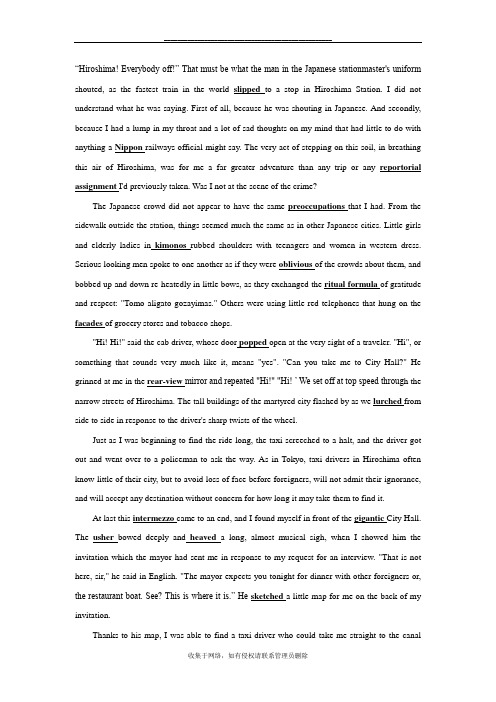
“Hiroshima! Everybody off!” That must be what the man in the Japanese stationmaster's uniform shouted, as the fastest train in the world slipped to a stop in Hiroshima Station. I did not understand what he was saying. First of all, because he was shouting in Japanese. And secondly, because I had a lump in my throat and a lot of sad thoughts on my mind that had little to do with anything a Nippon railways official might say. The very act of stepping on this soil, in breathing this air of Hiroshima, was for me a far greater adventure than any trip or any reportorial assignment I'd previously taken. Was I not at the scene of the crime?The Japanese crowd did not appear to have the same preoccupations that I had. From the sidewalk outside the station, things seemed much the same as in other Japanese cities. Little girls and elderly ladies in kimonos rubbed shoulders with teenagers and women in western dress. Serious looking men spoke to one another as if they were oblivious of the crowds about them, and bobbed up and down re-heatedly in little bows, as they exchanged the ritual formula of gratitude and respect: "Tomo aligato gozayimas." Others were using little red telephones that hung on the facades of grocery stores and tobacco shops."Hi! Hi!" said the cab driver, whose door popped open at the very sight of a traveler. "Hi", or something that sounds very much like it, means "yes". "Can you take me to City Hall?" He grinned at me in the rear-view mirror and repeated "Hi!" "Hi! ’ We set off at top speed throug h the narrow streets of Hiroshima. The tall buildings of the martyred city flashed by as we lurched from side to side in response to the driver's sharp twists of the wheel.Just as I was beginning to find the ride long, the taxi screeched to a halt, and the driver got out and went over to a policeman to ask the way. As in Tokyo, taxi drivers in Hiroshima often know little of their city, but to avoid loss of face before foreigners, will not admit their ignorance, and will accept any destination without concern for how long it may take them to find it.At last this intermezzo came to an end, and I found myself in front of the gigantic City Hall. The usher bowed deeply and heaved a long, almost musical sigh, when I showed him the invitation which the mayor had sent me in response to my request for an interview. "That is not here, sir," he said in English. "The mayor expects you tonight for dinner with other foreigners or, the restaurant boat. See? This is where it is.” He sketched a little map for me on the back of my invitation.Thanks to his map, I was able to find a taxi driver who could take me straight to the canalembankment , where a sort of barge with a roof like one on a Japanese house was moored . The Japanese build their traditional houses on boats when land becomes too expensive. The rather arresting spectacle of little old Japan adrift adrift amid beige concrete skyscrapers is the very symbol of the incessant struggle between the kimono and the miniskirt.At the door to the restaurant, a stunning, porcelain-faced woman in traditional costume asked me to remove my shoes. This done, I entered one of the low-ceilinged rooms of the little floating house, treading cautiously on the soft matting and experiencing a twinge of embarrassment at the prospect of meeting the mayor of Hiroshima in my socks.He was a tall, thin man, sad-eyed and serious. Quite unexpectedly, the strange emotion which had overwhelmed me at the station returned, and I was again crushed by the thought that I now stood on the site of the first atomic bombardment, where thousands upon thousands of people had been slain in one second, where thousands upon thousands of others had lingered on to die in slow agony .The introductions were made. Most of the guests were Japanese, and it was difficult for me to ask them just why we were gathered here. The few Americans and Germans seemed just as inhibited as I was. "Gentlemen," said the mayor, "I am happy to welcome you to Hiroshima."Everyone bowed, including the Westerners. After three days in Japan, the spinal column becomes extraordinarily flexible."Gentlemen, it is a very great honor to have you her e in Hiroshima."There were fresh bows, and the faces grew more and more serious each time the name Hiroshima was repeated."Hiroshi ma, as you know, is a city familiar to everyone,” continued the mayor."Yes, yes, of course,” murmured the company, more and more agitated."Seldom has a city gained such world renown, and I am proud and happy to welcome you to Hiroshima, a town known throughout the world for its--- oysters".I was just about to make my little bow of assent, when the meaning of these last words sank in, jolting me out of my sad reverie ."Hiroshima –oysters? What about the bomb and the misery and humanity's most heinous crime?" While the mayor went on with his speech in praise of southern Japanese sea food, I cautiously backed away and headed toward the far side of the room, where a few men were talkingamong themselves and paying little attention to the mayor's speech. "You look puzzled," said a small Japanese man with very large eye-glasses."Well, I must confess that I did not expect a speech about oysters here. I thought that Hiroshima still felt the impact of the atomic impact .""No one talks about it any more, and no one wants to, especially, the people who were born here or who lived through it. "Do you feel the same way, too?""I was here, but I was not in the center of town. I tell you this because I am almost an old man. There are two different schools of thought in this city of oysters, one that would like to preserve traces of the bomb, and the other that would like to get rid of everything, even the monument that was erected at the point of impact. They would also like to demolish the atomic museum.""Why would they want to do that?""Because it hurts everybody, and because time marches on. That is why." The small Japanese man smiled, his eyes nearly closed behind their thick lenses. "If you write about this city, do not forget to say that it is the gayest city in Japan, even it many of the town's people still bear hidden wounds, and burns."Like any other, the hospital smelled of formaldehyde and ethere . Stretchers and wheelchairs lined the walls of endless corridors, and nurses walked by carrying Stretchers instruments, the very sight of which would send shivers down the spine of any healthy visitor. The so-called atomic section was located on the third floor. It consisted of 17 beds."I am a fisherman by trade. I have been here a very long time, more than twenty years, "said an old man in Japanese pajamas. “What is wrong with you?”"Something inside. I was in Hiroshima when it happened. I saw the fire ball. But I had no burns on my face or body. I ran all over the city looking for missing friends and relatives. I thought somehow I had been spared. But later my hair began to fall out, and my belly turned to water. I felt sick, and ever since then they have been testing and treating me. " The doctor at my side explained and commented upon the old man's story, "We still hare a handful of patients here who are being kept alive by constant car e. The other s died as a result of their injuries, or else committed suicide . ""Why did they commit suicide?""It is humiliating to survive in this city. If you bear any visible scars of atomic burns, your children will encounter prejudice on the par t of those who do not. No one will marry the daughter or the niece of an atomic bomb victim. People are afraid of genetic damage from the radiation." The old fisherman gazed at me politely and with interest.Hanging over the patient was a big ball made of bits of brightly colored paper, folded into the shape of tiny birds. "What's that?" I asked."Those are my lucky birds. Each day that I escape death, each day of suffering that helps to free me from earthly cares, I make a new little paper bird, and add it to the others. This way I look at them and congratulate myself of the good fortune that my illness has brought me. Because, thanks to it, I have the opportunity to improve my character."Once again, outside in the open air, I tore into little pieces a small notebook with questions that I'd prepared in advance for inter views with the patients of the atomic ward. Among them was the question: Do you really think that Hiroshima is the liveliest city in Japan? I never asked it. But I could read the answer in every eye.“广岛到了!大家请下车!”当世界上最快的高速列车减速驶进广岛车站并渐渐停稳时,那位身着日本火车站站长制服的男人口中喊出的一定是这样的话。
高级英语--第二课-Marrakech-完备课件

His Life
– He is mush praised in the west partly because of his anti-communist point of view.
– He was born in India, father, a so called empirebuilder --serving the British government abroad.
A short novel that criticizes the Soviet Union, one of England's allies in World War II . It is an entertaining story about animals or, on a deeper level, a savage attack on the misuse of political power.
1. His works show sharp powers of observation and deep sympathy for suffering people.
2. His works give a deep sense of conviction and urgency.
3. The use of English is clear, simple and direct, with no formality of embellishment(润色). (addition/decoration) He said his ideal was to write prose like a window pane---as clear as glass
His Life
– He received good education in Britain and studied in the most famous school “Eden”.
(完整版)高英第2课课文
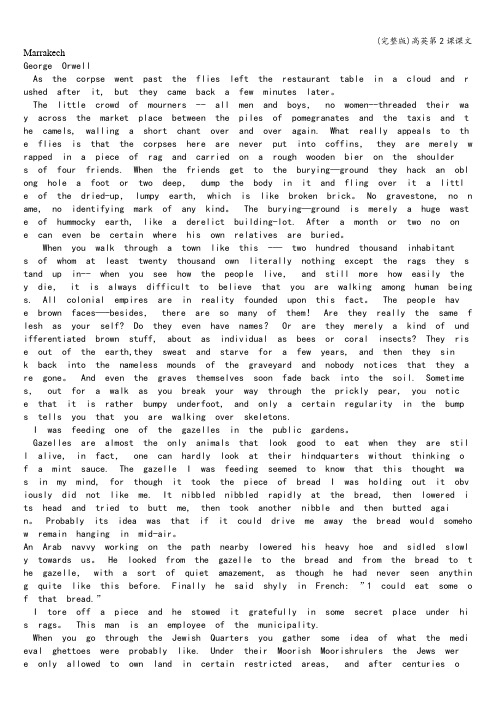
MarrakechGeorge OrwellAs the corpse went past the flies left the restaurant table in a cloud and r ushed after it, but they came back a few minutes later。
The little crowd of mourners -- all men and boys,no women--threaded their wa y across the market place between the piles of pomegranates and the taxis and t he camels, walling a short chant over and over again. What really appeals to th e flies is that the corpses here are never put into coffins,they are merely w rapped in a piece of rag and carried on a rough wooden bier on the shoulders of four friends. When the friends get to the burying—ground they hack an obl ong hole a foot or two deep,dump the body in it and fling over it a littl e of the dried-up,lumpy earth, which is like broken brick。
No gravestone, no n ame, no identifying mark of any kind。
高级英语第二课

Lesson 2: Four Choices for Young PeopleShortly before his graduation, Jim Binns, president of the senior class at Stanford University, wrote me about some of his misgivings. "More than any other generation," he said, "our generation views the adult world with great skepticism... there is also an increased tendency to reject completely that world."Apparently he speaks for a lot of his contemporaries. During the last few years, I have listened to scores of young people, in college and out, who were just as nervous about the grown-p world. Roughly, their attitude might be summed up about like this: "The world is in pretty much of a mess, full of injustice, poverty, and war. The people responsible are, presumably, the adults who have been running thing. If they can't do better than that, what have they got to teach our generation? That kind of lesson we can do without."There conclusions strike me as reasonable, at least from their point of view. The relevant question for the arriving generation is not whether our society is imperfect (we can take that for granted), but how to deal with it. For all its harshness and irrationality, it is the only world we've got. Choosing a strategy to cope with it, then, is the first decision young adults have to make, and usually the most important decision of their lifetime. So far as I have been able to discover, there are only four basic alternatives:1. Drop OutThis is one of the oldest expedient s, and it can be practiced anywhere, at any age, and with or without the use of hallucinogens. It always has been the strategy of choice for people who find the world too brutal or too complex to be endured. By definition, this way of life is parasitic. In one way or another, its practitioners batten on the society which they scorn and in which they refuse to take any responsibility. Some of us find this distasteful - an undignified kind of life. Butfor the poor in spirit, with low levels of both energy and pride, it may be the least intolerable choice available.2. FleeThis strategy also has ancient antecedents. Ever since civilization began, certain individuals have tried to run away from it in hopes of finding a simpler, more pastoral, and more peaceful life. Unlike the dropouts, they are not parasites. They are willing to support themselves and to contribute something to the general community, but they simply don't like the environment of civilization; that is, the city, with all its ugliness and tension.The trouble with this solution is that it no longer is practical on a large scale. Our planet, unfortunately, is running out of noble savages and unsullied landscape; except for the polar regions, the frontiers are gone. A few gentleman farmers with plenty of money can still escape to the bucolic life - but in general the stream of migration is flowing the other way.3. Plot a RevolutionThis strategy is always popular among those who have no patience with the tedious working of the democratic process or who believe that basic institutions can only be changed by force. It attracts some of the more active and idealistic young people of every generation. To them it offers a romantic appeal, usually symbolized by some dashing and charismatic figure.It has the even greater appeal of simplicity: "Since this society is hopelessly bad, let's smash it and build something better on the ruins."Some of my best friends have been revolutionists, and a few of them have led reasonably satisfying lives. These are the ones whose revolutions did not come off; they have been able to keep on cheerfully plotting their holocausts right into their senescence. Others died young, in prison or on the barricade s. But the most unfortunate are those whose revolutions havesucceeded. They lived, in bitter disillusionment, to see the establishment they had overthrown replaced by a new one, just as hard-faced and stuffy.I am not, of course, suggesting that revolutions accomplish nothing. Some (The American Revolution, the French Revolution) clearly do change things for the better. My point is merely that the idealists who make the revolution are bound to be disappointed in either case. For at best their victory never dawns on the shining new world they had dreamed of, cleansed of all human meanness. Instead it dawns on a familiar, workaday place, still in need of groceries and sewage disposal. The revolutionary state, under whatever political label, has to be run-not by violent romantics-but by experts in marketing, sanitary engineering, and the management of bureaucracies.For the idealists who are determined to remake society, but who seek a more practical method that armed revolution, there remains one more alternative.4. Try to Change the World Gradually, One Clod at a TimeAt first glance, this course is far from inviting. It lacks glamour. It promises no quick results. It depends on the exasperating and uncertain instruments of persuasion and democratic decision making. It demands patience, always in short supply. About all that can be said for it is that it sometimes works - that in this particular time and place it offers a better chance for remedying some of the world's outrages than any other available strategy.So at least the historical evidence seems to suggest. When I was graduating from college, my generation also found the world in a mess. The economic machinery had broken down almost everywhere: In this country nearly a quarter of the population was out of work. A major war seemed all too likely. As a college newspaper editor at that time, I protested against this just as vehemently as student activists are protesting today.At the same time, my generation was discovering that reforming the world is a little like fighting a military campaign in the Apennines, as soon as you capture one mountain range, another one looms just ahead. As the big problems of the thirties were brought under some kind of rough control, new problems took their place - the unprecedented problems of an affluent society, of racial justice, of keeping our cities from becoming uninhabitable, of coping with war in unfamiliar guises. Most disturbing of all was our discovery of the population explosion. It dawned on us rather suddenly that the number of passengers on the small spaceship we inhabit is doubling about every forty years. So long as the earth's population keeps growing at this cancerous rate, all of the other problems appear virtually insoluble. Our cities will continue to become more crowded and noisome. The landscape will get more clutter ed, the air and water even dirtier. The quality of life is likely to become steadily worse for everybody. And warfare on a rising scale seems inevitable if too many bodies have to struggle for ever-dwindling shares of food and living space.So Jim Binns' generation has a formidable job on its hands. But not, I think, an insuperable one. On the evidence of the past, it can be handled in the same way that hard problems have been coped with before-piecemeal, pragmatically, by the dogged 勤劳的蜜蜂有糖吃efforts of many people.。
高级英语第二课习题答案
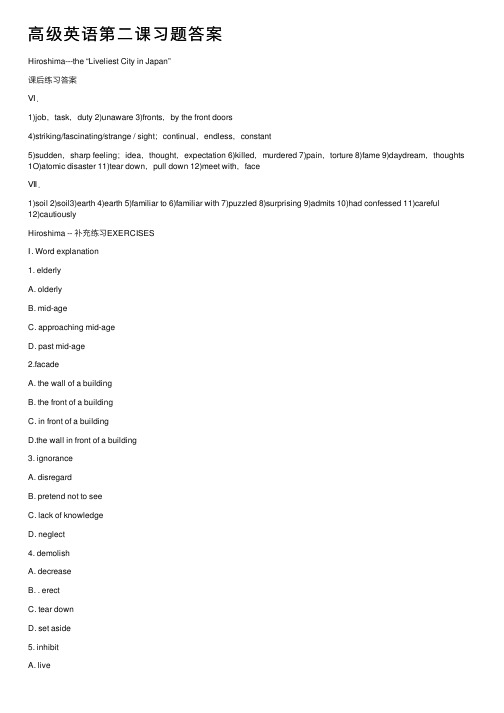
⾼级英语第⼆课习题答案Hiroshima---the “Liveliest City in Japan”课后练习答案Ⅵ.1)job,task,duty 2)unaware 3)fronts,by the front doors4)striking/fascinating/strange / sight;continual,endless,constant5)sudden,sharp feeling;idea,thought,expectation 6)killed,murdered 7)pain,torture 8)fame 9)daydream,thoughts 1O)atomic disaster 11)tear down,pull down 12)meet with,faceⅦ.1)soil 2)soil3)earth 4)earth 5)familiar to 6)familiar with 7)puzzled 8)surprising 9)admits 10)had confessed 11)careful12)cautiouslyHiroshima -- 补充练习EXERCISESⅠ. Word explanation1. elderlyA. olderlyB. mid-ageC. approaching mid-ageD. past mid-age2.facadeA. the wall of a buildingB. the front of a buildingC. in front of a buildingD.the wall in front of a building3. ignoranceA. disregardB. pretend not to seeC. lack of knowledgeD. neglect4. demolishA. decreaseB. . erectC. tear downD. set aside5. inhibitA. liveB. dwellC. suppressD. unlock6. bargeA. a kind of clothB. a kind of clothingC. a colour7. scarA. a woundB. a hidden woundC. a mark on the skinD. a mark of damage8. commitA. to doB. to commissionC. to trustD. to place an order9. preserveA. to keep from dangerB. . to serve in advanceC. . to saveD. . to reserve10. consist ofA. be composed ofB. be composed ofC. containD. include11. lumpB. massC. limpD. lung12. gratitudeA. appreciationB. thankfulnessC.gratefulnessD.all the above13. haltA. stopB. preventC. saluteD. alter14. destinationA. destinyB. desperateC. goalD. doom15. sketchA. stretchB. skepticD. drawⅡ. Replace each underlined part with one word learnt in the text, the first letter of which is given:1. The teacher answered with a brief nod of agreement.a2. The book was so interesting that I was practicallyunconscious of my surroundings. o3. The thought of his past experience of stealing bringshim a sudden sharp pain of conscience.t4. I see little hope of his recovery.p5. His greatest concern washow to find money for aholiday in Europe.p6. She shouldn't have come to the hotel suite. She shouldn't have delayed leaving --- this was fatal --- afterothers had left.l7. If I had been less careful I might have been morewise.c8. They faced one another in the boxing ring.e9. The town will build a monument to its war heroes.e10. She was deeply disturbed until she learned that herhusband was among the survivors.aⅢ. Fill in each of the blanks with one of the following words or expressions in its proper form. Each word or expression is to be used only once.to have a lump in one's throat, spare, spectacle, on the part of, rub shoulders with, humiliate, shiver, sink in, in response, foldtrouble as a consequence.2. The children at play among the flowers made quite a4. Twice I put the request to him, but he said nothing5. All during her mother's funeral, Alice6. You should disdain7.they'll be easier to carry.her by foreign invaders.9. The victorious enemy10. Judging from thecold outsideⅤ. Reading comprehension.1. The sentence “little girls and elderly ladies in kimonos rubbed shoulders with teenagers and women in western dress”shows that __.A. western influence and national traditionco-existed in JapanB. There were lots of female walking in the streets.C. . Little girls and elderly women wore kimonos but teenagers and women wore western dressD. Women in Japan wore different clothes2. The sentence “the usher bowed deeply and heaved a long, almost musical sigh” shows that __.A. the usher was pleasant and loved musicB. the usher was bored but still very politeC. the was boring but still kept his politenessD. the usher was boring but still wanted to keep himself in pleasant mood3.The author’s description of the mayor “he was a tall, thin man, sad-eyed and serious” shows that __.A. the meeting with the author who was an American reminded the mayor of the atomic crimeB. the mayor must be in sad mood that night.C. the author’s own mentality distorted the image of the mayorD. the mayor did not want to talk with the author4. The sentence “there are two different schools of thought in this city of oysters” means __.A. people in Hiroshima hold different opinions on the A-bomb attackB. people in Hiroshima hold different opinions on World War IIC. people in Hiroshima hold different opinions on how to treat the remnants of the A-bomb attack.D. people in Hiroshima hold different opinions on how to preserve their memory of the A-bomb attack5. The sentence “the very sight of which would send shivers down the spine of any healthy visitor” means __.A. any healthy visitor would feel uneasy when he saw the medical instrumentsB. Any healthy visitor would start trembling when he saw the medical instrumentsC. the medical instruments were burnished and coldD. as soon as he saw the cold medical instruments, the visitor began shivering6. The expression “earthly cares” in this text can be best understood as __.A. daily worries such as food, clothing and etcB. global considerations such as environment and etcC. social conflicts such as terrorism, disarmament and etc.D. everyday business such as economy and finance and etc.第⼀册第2课练习答案1-1: /答案:D1-2: /答案:B 1-3: /答案:C 1-4: /答案:C 1-5: /答案:C 1-6: /答案:D 1-7: /答案:D 1-8: /答案:A 1-9: /答案:A 1-10: /答案:A 1-11: /答案:B 1-12: /答案:D 1-13: /答案:A 1-14: /答案:C 1-15: /答案:D 2-1: /答案:assent2-2: /答案: oblivious2-3: /答案:twinge2-4: /答案:prospect答案:preoccupation2-6: /答案: lingered2-7: /答案: cautious2-8: /答案:encountered2-9: /答案:erect3-0: /答案: agitated3-1: /答案: sink in3-2: /答案: spectacle3-3: /答案: on the part of3-4: /答案: in response3-5: /答案: had a lump in her throat答案: to rub shoulders with 3-7: /答案: Fold3-8: /答案:humiliating3-9: /答案:spared3-10: /答案: shivering 4-1: /答案:A4-2: /答案:B4-3: /答案:C4-4: /答案:D4-5: /答案:A4-6: /答案:A。
高级英语第二册第二课Marrakech

• They rise out of the earth,… are gone. • They are born. Then for a few years they work, toil and starve. Finally they die and are buried in graves without a name,and nobody notices that they are dead.
•
• flesh: • mankind,human beings
• undifferentiated brown stuff: • sth brown in color with no individual characteristics.
• coral:珊瑚的; 珊瑚色的 • coral insects:珊瑚虫
• alliteration (押头韵) • showing the monotonous life.
• sink into:渗入; 陷入; 沉入; 把…投入
• The facts don't seem to sink into his
head. • 他似乎没有牢记这些事实。
• mound (n.) : a pile of earth or stones that looks like a small hill 土堆;土丘; 坟堆
• Sometimes, out for a walk as you break your way through the prickly pear, you notice that it is rather bumpy underfoot, and only a certain regularity in the bumps tells you that you are walking over skeletons.”
高级英语第二课

我们都根据各自不同的能力听音乐。但为了便于分析,如果把听音乐的过程分成姑妄称之为其构成部分,那么就可以说得清楚一些。从某种意义上说来,我们都在三个不同的层次上听音乐,因为缺少更确切的词汇,姑且称之为:1)美感层次,2)表现层次,3)纯音乐层次。 将听音乐的过程机械地分成这些假设的层次能得到的唯一好处是可以对我们听的方式有个较清楚的观察。
听音乐最简单的方式就是从乐声本身中获取纯粹的美的享受,这就是美感层次。在这个层次上我们听音乐时不动脑筋,不在任何方面去进行思考。我们一面做着什么事,一面打开收音机,心不在焉地沉浸在乐声之中。单纯是音乐的感染力造成了一种无思维的然而是极有吸引力的心境。
高级英语课本第2课课件

Atomic Bombing over Hiroshima
On August 6, 1945, during World War II (1939-1945), the first atomic bomb was dropped on the city of Hiroshima, a military center, by the United States Army Air Forces. According to U.S. estimates, 60,000 to 70,000 people were killed or missing as a result of the bomb and many more were made homeless. (In 1940, the population of Hiroshima was 343,698.)
1. About Hiroshima 2. Atomic Bomb
#
Hiroshima
#
Hiroshima
Hiroshima, city on southwestern Honshû Island, Japan, capital of Hiroshima Prefecture, is at the head of Hiroshima Bay, an arm of the Inland Sea. The city was founded in 1594 on six islands in the Ôta River Delta. The name Hiroshima means broad Island. Hiroshima grew rapidly as a castle town and commercial city, and after 1868 it was developed as a military center.
- 1、下载文档前请自行甄别文档内容的完整性,平台不提供额外的编辑、内容补充、找答案等附加服务。
- 2、"仅部分预览"的文档,不可在线预览部分如存在完整性等问题,可反馈申请退款(可完整预览的文档不适用该条件!)。
- 3、如文档侵犯您的权益,请联系客服反馈,我们会尽快为您处理(人工客服工作时间:9:00-18:30)。
The influence of the Hiroshima bomb
I was again overcome by a guilty conscience as I had been when I first arrived at the station. Died slowly and in great pain (emotion: ashamed and uneasy) (rhetoric:hyperboble)
Para10
Inhibited[adj.]:too embarrassed or nervous to do or say what you want.拘束的,拘谨的 emotion: ashamed and uneasy (the few Americans and Germans also seemed to feel restrained like me )
Para19
heinous[adj]:(formal) morally very bad 及其可恶的,邪恶的,十恶不赦的。 语境:a heinous crime/criminal十恶不赦 的罪行/罪犯
Para22
impact[n].①(U)(on,against)冲击( 力),撞击. ②(C)[an~](on) the powerful effect that sth.has on sb/sth. ( 强烈的)影响,效果 搭配:effect/impact+on 对…的影响 cataclysm (n) a sudden disaster or a violent event that causes change,for example a flood or a war 大变动,灾 难,大洪水,地震
I was on the point of showing my agreement by nodding when I suddenly realized what he meant .his words shocked me out of my sad dreamy thinking. (emtion:sad ,)
Para23
【Paraphrase】In the city,we no longer talk abo especially the natives and the survivors, they hate to discuss it 【注释】与渐降相反,作者在此运用 了层递,又叫渐升(climax)。是把一 系列的短语或句子用升级的方法按语 势的强度顺序排列的一种修辞手法。 这里作者采用了层递的修辞手法。
Para18
Assent[n.]: formal approval or agreement from som eone who has authority同意,赞成 Jolt[v.]: to give someone a sudden shock or surprise使某人吃惊 Reverie[n.]: a state of imagining or thinking about pleasant things,that is like dreaming幻 想,白日梦
Para.
Para.6-27
Class
Group
Para.7
1.Thanks to his map, I was able to find a taxi driver who could take me straight to the cananl embankment, where a sort of barge with a roof like one on a Japanese house was morrred.
Para17
Oyster[n.]: a type of shell that can be eaten cooked or uncooked,and that pruduces a jewel called a PEARL牡蛎,蚝 (这段修辞手法:反高潮,渐降?) (rhetoric:irony讽刺) (Oyster-The Hiroshima boom.)
Para.7
2.The rather arresting apectacle of little old Japan adrift amid beige concrete skyscrapers is the very symbol of the incessant struggle between the kimono and the miniskirt. arreting: attracting a lot of attention; very attractive Paraphrase: It was a very special and striking phenomennon that the small old Japanese houses mixed with the high beigh buildings made of concrete, and the traditional kimono mixed with the morden western suits.
para12
Spinal[adj.]:belonging to or affecting your SPINE脊柱的,脊椎的 Column:technical your SPINE【术语】脊 柱 Flexible[adj.]: something that is flexible can bend or be bent easily易弯曲的,有弹 性的
(the face grew more and more serious) The mayor mentioned Hiroshima repeatedly and to the author the repeated mention of the name create a suspense which he found hard to bear.
Para.8
4.This done, I entered one of the…experiencing a twinge of embarrassment at the prospect of meeting the mayor of Hiroshima in my socks. twinge: a sudden short feeling of an unpleasant emotion e.g: 1. I feel a twinge in my back now and again. 2. This gave me more than a twinge of uneasiness.
Para.8
3.At the door to the restaurant, a stunning, porcelian-faced woman in traditional costume asked me to remove my shoes. stunning: extremely attractive or impressive porcelain: a hard white shiny substance made by baking clay and uesd for making delicate cups, plates and decorative objects,; objiects that are mad for this. Paraphrase: A very charming Japanese woman whose face was as white and smooth as porcelain was standing at the door to the resturant and she asked me to take off my shoes before getting in.
twinge, pain
twinge 特指自己感觉到的轻微疼痛 pain 泛指身体或心理上受到伤害而感觉到的疼痛
Para.9
Overwhelm[v.]:if someone is overwhelmed by an emotion, they feel it so strongly that they cannot think clearly使某人感到不能自持,是不知所措 Crush[v.]:to make someone feel extremely upset or shocked使非常伤心,使震惊 Bombardment[n.]:a continuous attack on a place by big guns and bombs炮轰,轰炸 Slay[v.]:to kill someone杀害,残杀,谋杀 Linger[v.]:to continue to exist,be noticeable etc.for longer than is usual or desirable继续存留 Agony[n.]:very severe pain 极大的痛苦
Para16
Agitated[adj.]: so nervous or upset that you are unable to keep still or think calmly紧张不 安的,焦虑的 It is considered that the mayor will say involved in the history of the Hiroshima boom. (emotion:more and more ashamed and jitter)
embankment: dike, raised mound of earth, earthwork, rampart. barge: flat-bottomed freight boat.
Paraphrase: Thanks to the clear and simple sketch the usher made for me, the taxi driver was able to take me straight to the canal bank. A large flat-bottomed boat was there which had a roof like that of a Japanese house.
